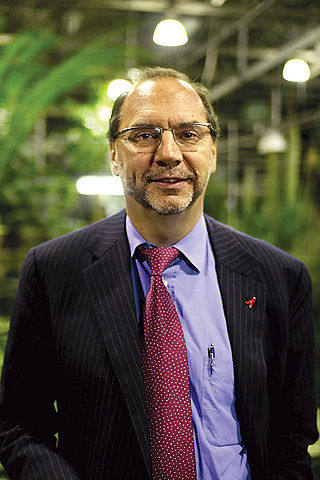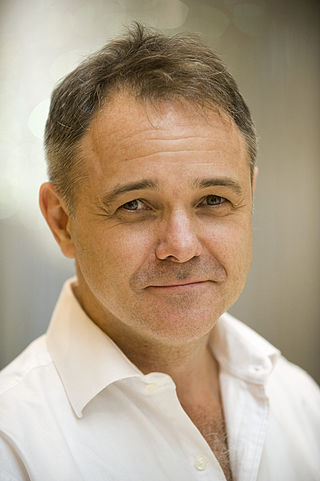
Sir Peter Karel, Baron Piot, is a Belgian-British microbiologist known for his research into Ebola and AIDS.
Sir Roy Malcolm Anderson is a leading international authority on the epidemiology and control of infectious diseases. He is the author, with Robert May, of the most highly cited book in this field, entitled Infectious Diseases of Humans: Dynamics and Control. His early work was on the population ecology of infectious agents before focusing on the epidemiology and control of human infections. His published research includes studies of the major viral, bacterial and parasitic infections of humans, wildlife and livestock. This has included major studies on HIV, SARS, foot and mouth disease, bovine tuberculosis, bovine spongiform encephalopathy (BSE), influenza A, antibiotic resistant bacteria, the neglected tropical diseases and most recently COVID-19. Anderson is the author of over 650 peer-reviewed scientific articles with an h-index of 125.

Christopher Dye FRS, FMedSci is a biologist, epidemiologist and public health specialist. He is Professor of Epidemiology at the University of Oxford and formerly Director of Strategy at the World Health Organization.

Sir Jeremy James Farrar is a British medical researcher who has served as Chief Scientist at the World Health Organization since 2023. He was previously the director of The Wellcome Trust from 2013 to 2023 and a professor of tropical medicine at the University of Oxford.
Anne Walsh Rimoin is an American infectious disease epidemiologist whose research focuses on emerging infectious diseases (EIDs), particularly those that are crossing species from animal to human populations. She is a professor of epidemiology at the UCLA Fielding School of Public Health and Infectious Disease Division of the Geffen School of Medicine and is the Director of the Center for Global and Immigrant Health. She is an internationally recognized expert on the epidemiology of Ebola, human monkeypox, and disease emergence in Central Africa.
Gagandeep Kang FRS is an Indian microbiologist and virologist who has been leading the work on enteric diseases, diarrheal infections and disease surveillance at the Bill & Melinda Gates Foundation since 2023.

The Coalition for Epidemic Preparedness Innovations (CEPI) is a foundation that takes donations from public, private, philanthropic, and civil society organisations, to finance independent research projects to develop vaccines against emerging infectious diseases (EID).

Disease X is a placeholder name that was adopted by the World Health Organization (WHO) in February 2018 on their shortlist of blueprint priority diseases to represent a hypothetical, unknown pathogen that could cause a future epidemic. The WHO adopted the placeholder name to ensure that their planning was sufficiently flexible to adapt to an unknown pathogen. Director of the US National Institute of Allergy and Infectious Diseases Anthony Fauci stated that the concept of Disease X would encourage WHO projects to focus their research efforts on entire classes of viruses, instead of just individual strains, thus improving WHO capability to respond to unforeseen strains. In 2020, experts, including some of the WHO's own expert advisors, speculated that COVID-19, caused by the SARS-CoV-2 virus strain, met the requirements to be the first Disease X.

Sir Christopher John MacRae Whitty is a British epidemiologist, serving as Chief Medical Officer for England and Chief Medical Adviser to the UK Government since 2019.
Jennifer Nuzzo is an American epidemiologist. She is Director of the Pandemic Center and Professor of Epidemiology at the Brown University School of Public Health, having previously taught at the Johns Hopkins Bloomberg School of Public Health. She is also a Senior Fellow for Global Health at the Council on Foreign Relations.

Neil Morris Ferguson is a British epidemiologist and professor of mathematical biology, who specialises in the patterns of spread of infectious disease in humans and animals. He is the director of the Jameel Institute, and of the MRC Centre for Global Infectious Disease Analysis, and head of the Department of Infectious Disease Epidemiology in the School of Public Health and Vice-Dean for Academic Development in the Faculty of Medicine, all at Imperial College London.

Richard Hatchett is an American oncologist and epidemiologist who has been serving as chief executive officer of the Coalition for Epidemic Preparedness Innovations (CEPI) in Oslo and London since 2017. He was awarded the Secretary of Health and Human Services's Award for Distinguished Service.

Michael Joseph Ryan is an Irish epidemiologist and former trauma surgeon, specialising in infectious disease and public health. He is executive director of the World Health Organization's Health Emergencies Programme, leading the team responsible for the international containment and treatment of COVID-19. Ryan has held leadership positions and has worked on various outbreak response teams in the field to eradicate the spread of diseases including bacillary dysentery, cholera, Crimean–Congo hemorrhagic fever, Ebola, Marburg virus disease, measles, meningitis, relapsing fever, Rift Valley fever, SARS, and Shigellosis.
Azra Catherine Hilary Ghani is a British epidemiologist who is a professor of Infectious Disease Epidemiology at Imperial College London. Her research considers the mathematical modelling of infectious diseases, including malaria, bovine spongiform encephalopathy and coronavirus. She has worked with the World Health Organization on their technical strategy for malaria. She is associate director of the MRC Centre for Global Infectious Disease Analysis.
Mark Edward John Woolhouse OBE FRSE FMedSci is professor of infectious disease epidemiology at the Usher Institute in the College of Medicine and Veterinary Medicine at the University of Edinburgh, Scotland.
The Scientific Advisory Group for Emergencies (SAGE) is a British Government body that advises central government in emergencies. It is usually chaired by the United Kingdom's Chief Scientific Adviser. Specialists from academia and industry, along with experts from within government, make up the participation, which will vary depending on the emergency. SAGE gained public prominence for its role in the 2020 COVID-19 pandemic in the United Kingdom.

Caitlin M. Rivers is an American epidemiologist who as Senior Scholar at the Johns Hopkins Center for Health Security and assistant professor at the Johns Hopkins Bloomberg School of Public Health, specializing on improving epidemic preparedness. Rivers is currently working on the American response to the COVID-19 pandemic with a focus on the incorporation of infectious disease modeling and forecasting into public health decision making.
Keith Neal FFPHM FRCP DM is emeritus professor in the epidemiology of infectious diseases at the University of Nottingham. He previously worked as a consultant epidemiologist for the Field Epidemiology Service of Public Health England.
Sir Peter William Horby is a British physician, epidemiologist, Moh Family Foundation Professor of Emerging Infections and Global Health, and Director of the Pandemic Sciences Institute at the University of Oxford. He is the founder, and former director of the Oxford University Clinical Research Unit in Hanoi, Vietnam which was founded in 2006. In 2014, Horby established the Epidemic Research Group Oxford (ERGO). ERGO incorporates a number of international projects such as the European Commission funded PREPARE, the African coaLition for Epidemic Research, Response and Training (ALERRT), and the International Severe Acute Respiratory and emerging Infection Consortium (ISARIC). Since 2016, Horby has been chair and executive director of ISARIC.
Gary P. Kobinger is a Canadian immunologist and virologist who is currently the director at the Galveston National Laboratory at the University of Texas. He has held previous professorships at Université Laval, the University of Manitoba, and the University of Pennsylvania. Additionally, he was the chief of the Special Pathogens Unit at the National Microbiology Laboratory (NML) of the Public Health Agency of Canada (PHAC) in Winnipeg, Manitoba, for eight years. Kobinger is known for his critical role in the development of both an effective Ebola vaccine and treatment. His work focuses on the development and evaluation of new vaccine platforms and immunological treatments against emerging and re-emerging viruses that are dangerous to human health.









